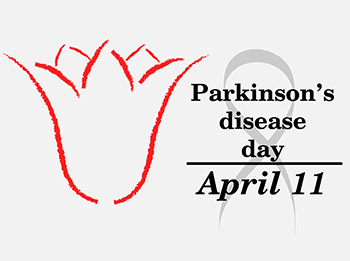
World Parkinson’s Day is April 11. We see the disease at our Morristown Assisted Living Community.
It begins with an unwanted and uncontrollable movement that affects an arm when it is at rest and stops for the duration of a voluntary movement. You feel abnormal stiffness and your movements slow noticeably. Perhaps you become less expressive in your facial expressions. You feel uncoordinated, your balance affected.
Your doctor refers you to a Neurologist, who specializes in diseases and disorders of the brain, spinal cord, nerves, and muscles, including stroke, Parkinson’s disease, epilepsy, Alzheimer’s disease, and muscular dystrophy. Even if you experience symptoms common among these, they may be brought on by a completely different condition altogether.
After ruling out some things, the diagnosis is reached: You have Parkinson’s disease, a chronic, degenerative neurological disorder that affects one in 100 people over age 60. While the average age at onset is 60, some people are diagnosed at 40 or younger. Estimates of the number of people living with the disease vary, but recent research indicates that at least one million people in the United States, and more than five million worldwide, have Parkinson’s disease, according to the website for the Michael J. Fox Foundation for Parkinson’s Disease.
Parkinson’s results from the loss of cells in various parts of the brain, including a region called the substantia nigra. The substantia nigra cells produce dopamine, a chemical messenger responsible for transmitting signals within the brain that allow for coordination of movement. Loss of dopamine causes neurons to fire without normal control, leaving patients less able to direct or control their movement.
Parkinson’s disease is often difficult to diagnose accurately, particularly when symptoms are mild. Dr. Joseph Jankovic suggests answering the following questions to help determine Parkinsonism and PD:
- Have you been getting slower in your usual daily activities?
- Is your handwriting smaller?
- Is your speech slurred or softer?
- Do you have trouble arising from a chair?
- Do your lips, hand, arms and/or legs shake?
- Have you noticed more stiffness?
- Do you have trouble buttoning buttons or dressing?
- Do you shuffle your feet and/or take smaller steps when you walk?
- Do your feet seem to get stuck to the floor when walking or turning?
- Have you or others noted that you don’t swing one arm when walking?
- Do you have more trouble with your balance?
- Have you or others noted that you stoop or have abnormal posture?
You can download and complete the full questionnaire
A Parkinson’s diagnosis can be frightening to face, especially if you encounter others in the later stages who experience involuntary flailing or jerking body movements or the sudden inability to move. “Awareness of such severe symptoms can understandably be upsetting, but remember that Parkinson’s disease is highly individualistic and your disease may never encompass any of these symptoms,” the Fox Foundation website states.
Parkinson’s is a condition we see residents struggle to cope with in our Assisted Living Community. Our communities can often give the person with Parkinson’s and their family a sense of peace of mind because of the fact that we have staff ready to offer assistance to those in need, and many of our residents struggle with their balance and moving around. We already provide railing and other tools to lower the probability of falls. As symptoms worsen, loss of balance can cause falls that result in serious injuries or death. The seriousness of these incidents depends greatly on the patient’s age, overall health, and disease stage.
Our staff offer assistance with activities and tasks of daily living, medication administration, and 24/7 licensed nursing staff on hand. Let us know how we can help!
Copyright: juliatera / 123RF Stock Photo
